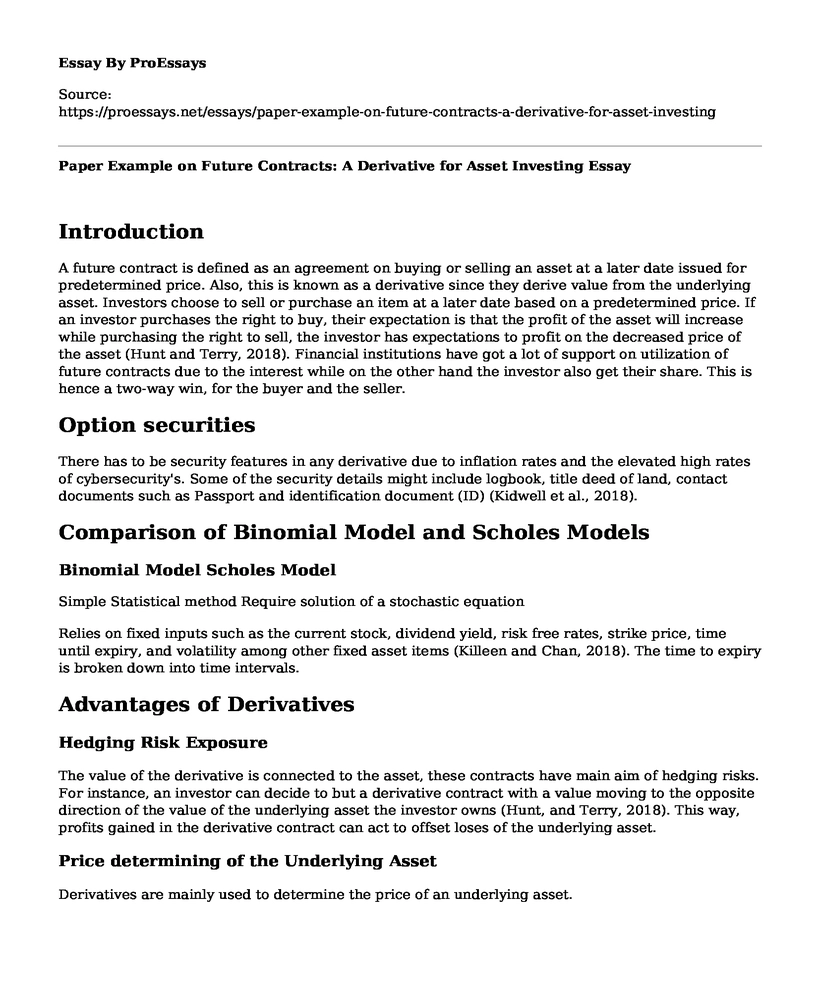Introduction
A future contract is defined as an agreement on buying or selling an asset at a later date issued for predetermined price. Also, this is known as a derivative since they derive value from the underlying asset. Investors choose to sell or purchase an item at a later date based on a predetermined price. If an investor purchases the right to buy, their expectation is that the profit of the asset will increase while purchasing the right to sell, the investor has expectations to profit on the decreased price of the asset (Hunt and Terry, 2018). Financial institutions have got a lot of support on utilization of future contracts due to the interest while on the other hand the investor also get their share. This is hence a two-way win, for the buyer and the seller.
Option securities
There has to be security features in any derivative due to inflation rates and the elevated high rates of cybersecurity's. Some of the security details might include logbook, title deed of land, contact documents such as Passport and identification document (ID) (Kidwell et al., 2018).
Comparison of Binomial Model and Scholes Models
Binomial Model Scholes Model
Simple Statistical method Require solution of a stochastic equationRelies on fixed inputs such as the current stock, dividend yield, risk free rates, strike price, time until expiry, and volatility among other fixed asset items (Killeen and Chan, 2018). The time to expiry is broken down into time intervals.
Advantages of Derivatives
Hedging Risk Exposure
The value of the derivative is connected to the asset, these contracts have main aim of hedging risks. For instance, an investor can decide to but a derivative contract with a value moving to the opposite direction of the value of the underlying asset the investor owns (Hunt, and Terry, 2018). This way, profits gained in the derivative contract can act to offset loses of the underlying asset.
Price determining of the Underlying Asset
Derivatives are mainly used to determine the price of an underlying asset.
Market efficiency
Derivatives ease financial markets. The use of derivative contracts can make one replicate the payoffs of the asset.
Gain Access to some unavailable assets in the Market
Derivatives act as a way of getting some assets that are not readily available in the market.
There are plenty derivatives that are used in real-world situations including stocks, bonds, commodities, interest rates, options, swaps, futures, currency rates and market indexes among others.
Pricing of a Derivative
The value of a derivative is determined following a process of evaluation. However, different types of derivatives have varied pricing techniques. For instance, in future pricing basics, the future's contract value is based on commodity's cash price. In option pricing basics, the underlying asset price is determined by the strike price with the main aim being probability that the pricing will be exercised (Kidwell et al., 2016).
Disadvantages of future contracts
Although derivatives have advantage that they bring to the financial market, there are some critical drawbacks that come with these financial instruments. These drawbacks resulted to myriad consequences during the 2007/08 financial year (Killeen and Chan, 2018). Also, the increasing devaluation of mortgage-backed securities as well as credit-default swaps have led to a collapse of financial institutions globally.
High Risk
Since derivatives have a high volatility, they have amassed losses. Also, the design of the contracts is sophisticated making the valuation process extremely complicated. Therefore, they have a high inherent risk.
Speculative features
Derivatives are a subject to speculation and hence need speculation tools. Following the exclusive risk associated with derivatives as well as their behavior that can not be predicted, having unreasonable speculation may lead to huge loses.
Counter-party risk
Even though derivatives accumulate trade exchanges that go through diligence process, over-the counter contracts do not have benchmark for due diligence. In that case, counter-party defaults are likely to occur.
References
Hunt, B., & Terry, C. (2018). Financial institutions and markets. Cengage AU.
Kidwell, D. S., Blackwell, D. W., Sias, R. W., & Whidbee, D. A. (2016). Financial institutions, markets, and money. John Wiley & Sons.
Killeen, A., & Chan, R. (2018). Global Financial Institutions 2.0. In Handbook of Blockchain, Digital Finance, and Inclusion, Volume 2 (pp. 213-242). Academic Press.
Cite this page
Paper Example on Future Contracts: A Derivative for Asset Investing. (2023, May 29). Retrieved from https://proessays.net/essays/paper-example-on-future-contracts-a-derivative-for-asset-investing
If you are the original author of this essay and no longer wish to have it published on the ProEssays website, please click below to request its removal:
- The Legal Framework of International Investment Protection
- Small and Medium Enterprises in South Korea on Example of Wedding Sector
- Paper Sample on Startups
- Essay on Codes of Conduct: Internal Guidelines and External Statements of Values
- Essay Sample on Navigating Ethical Dilemmas in Global Business: Finding Common Ground
- Essay Example on Adhering to Professional Ethics: A Necessity for All
- Essay Example on equal Opportunities & Benefits: Techfite's Corporate Policy A & B







